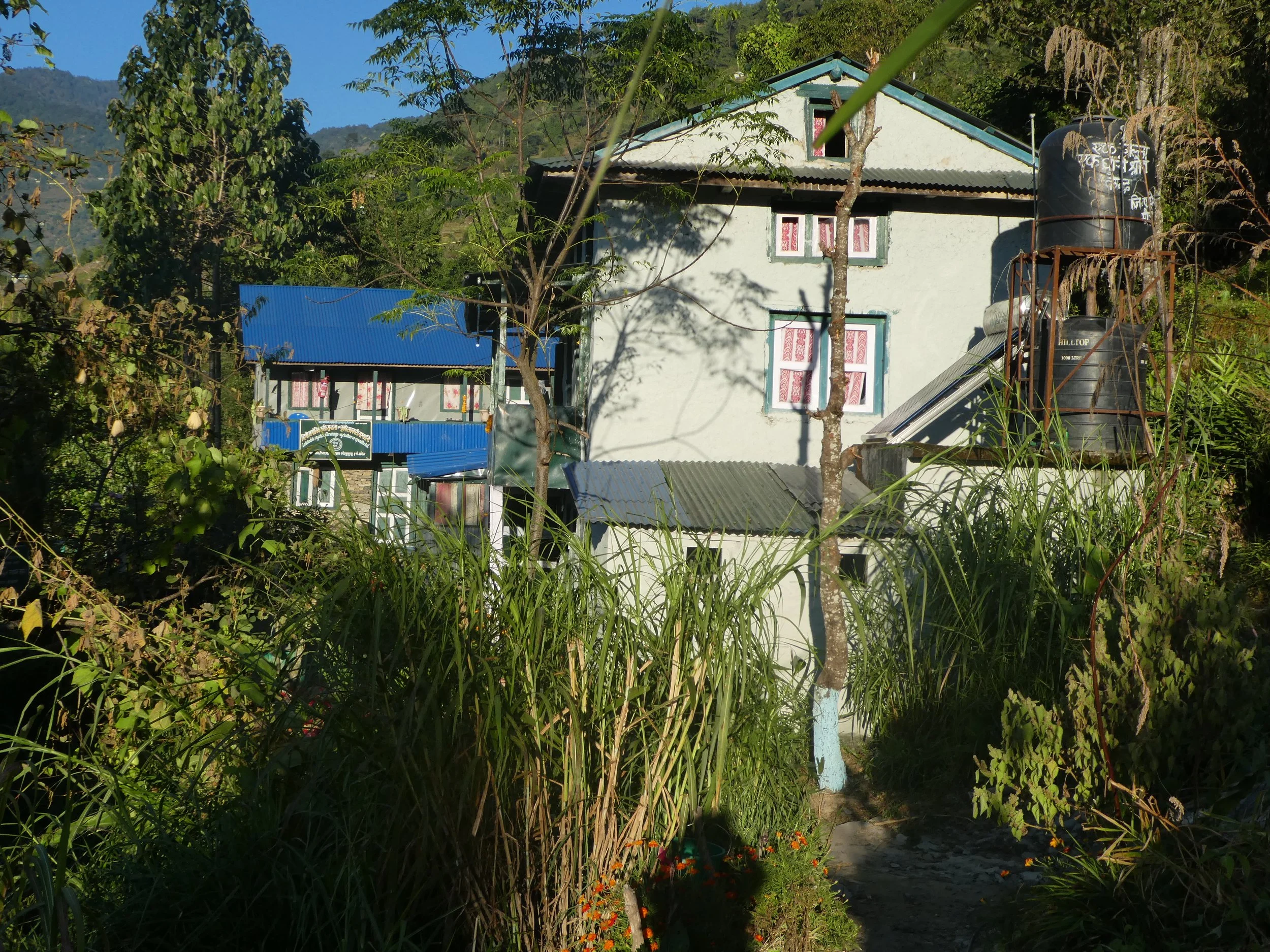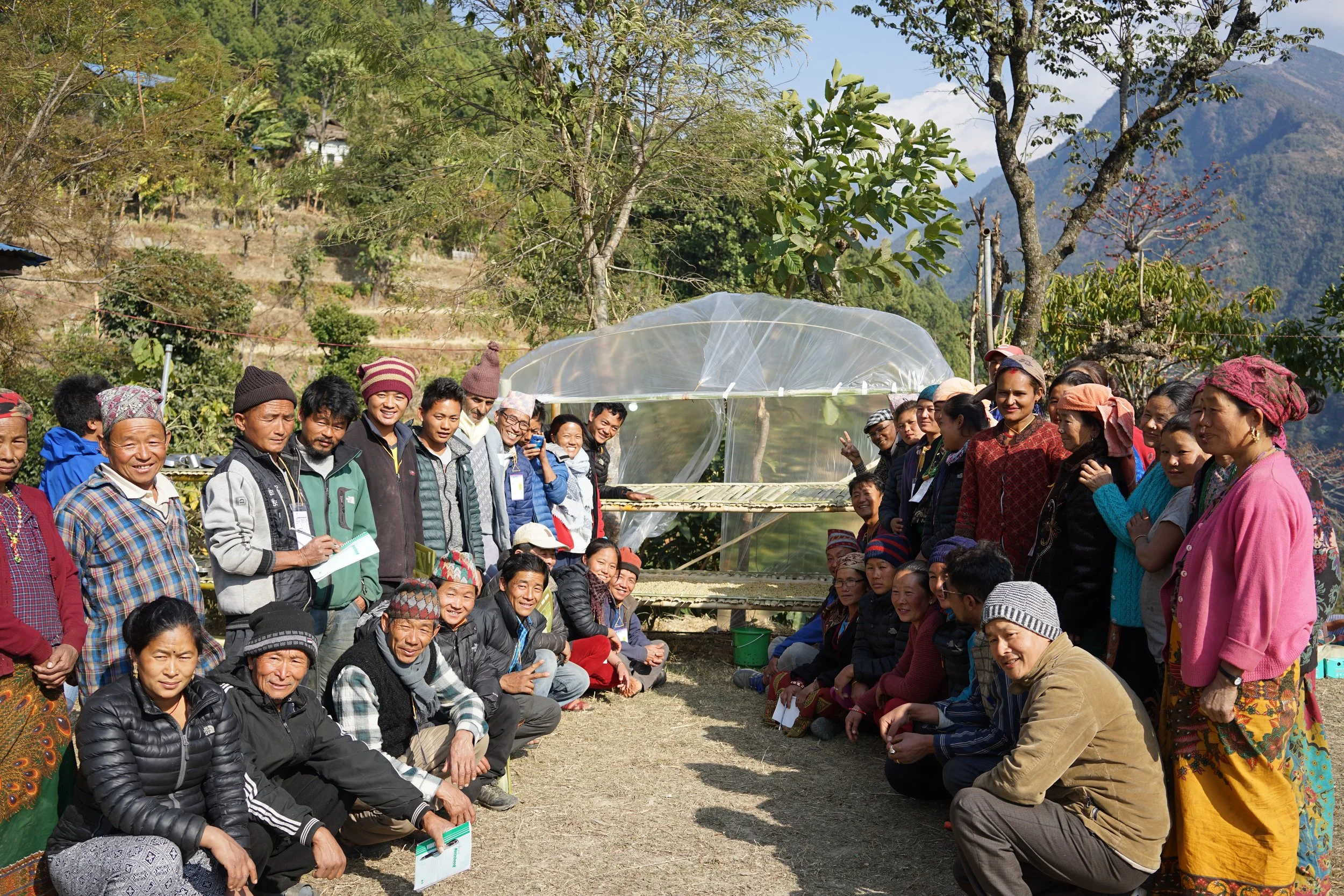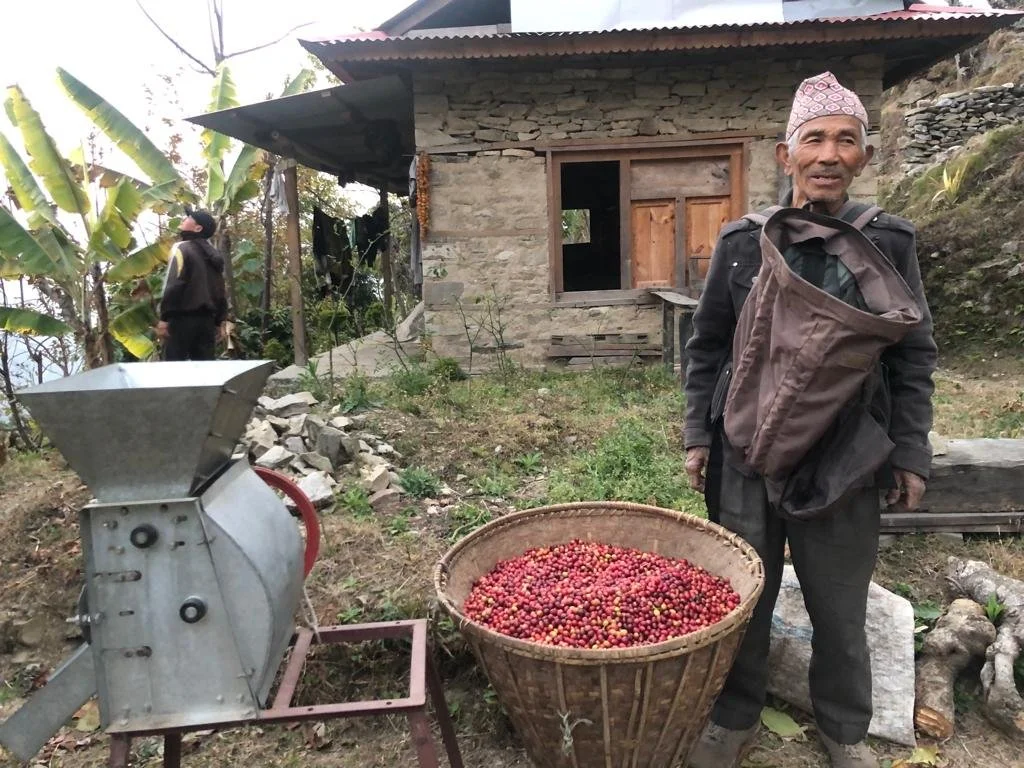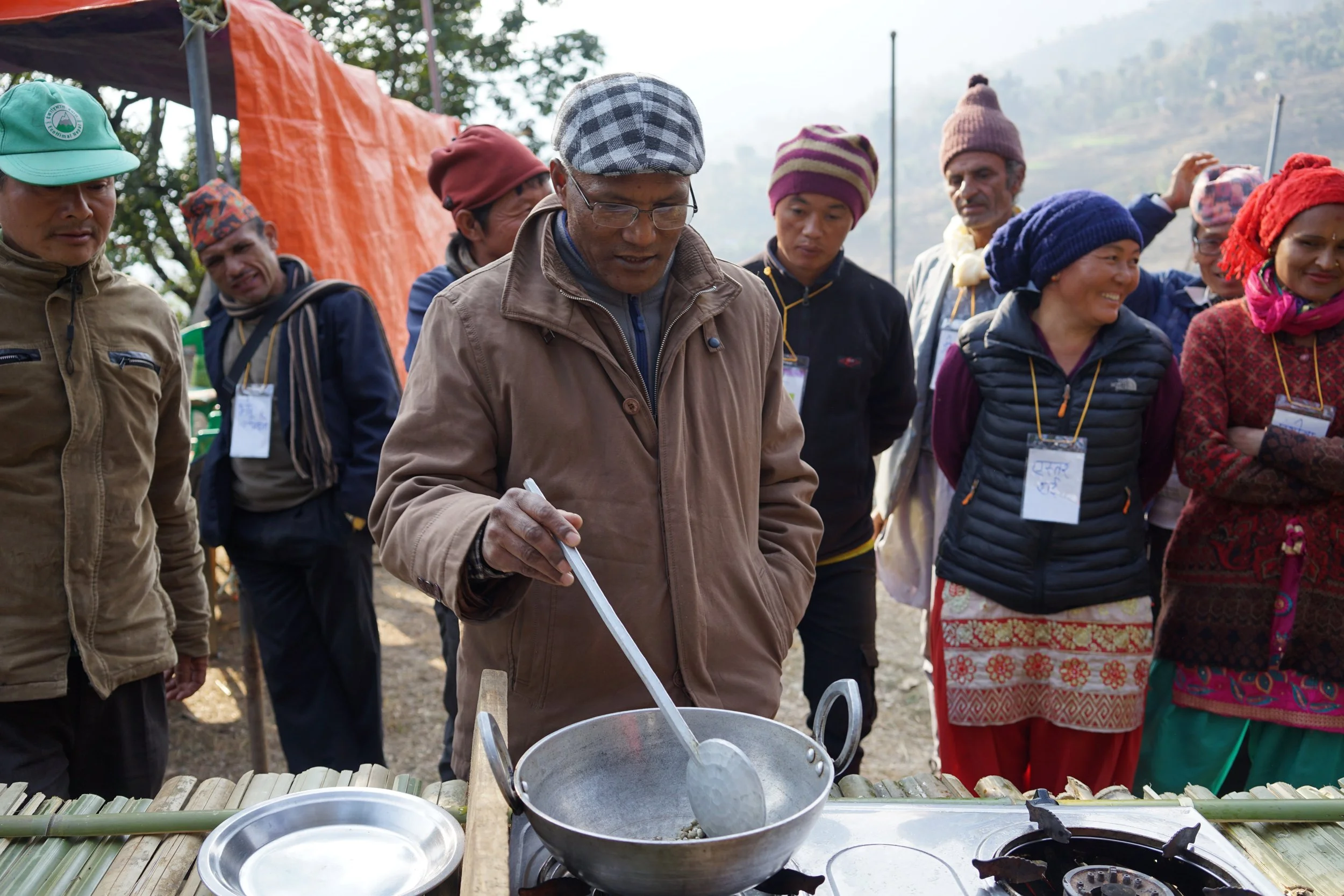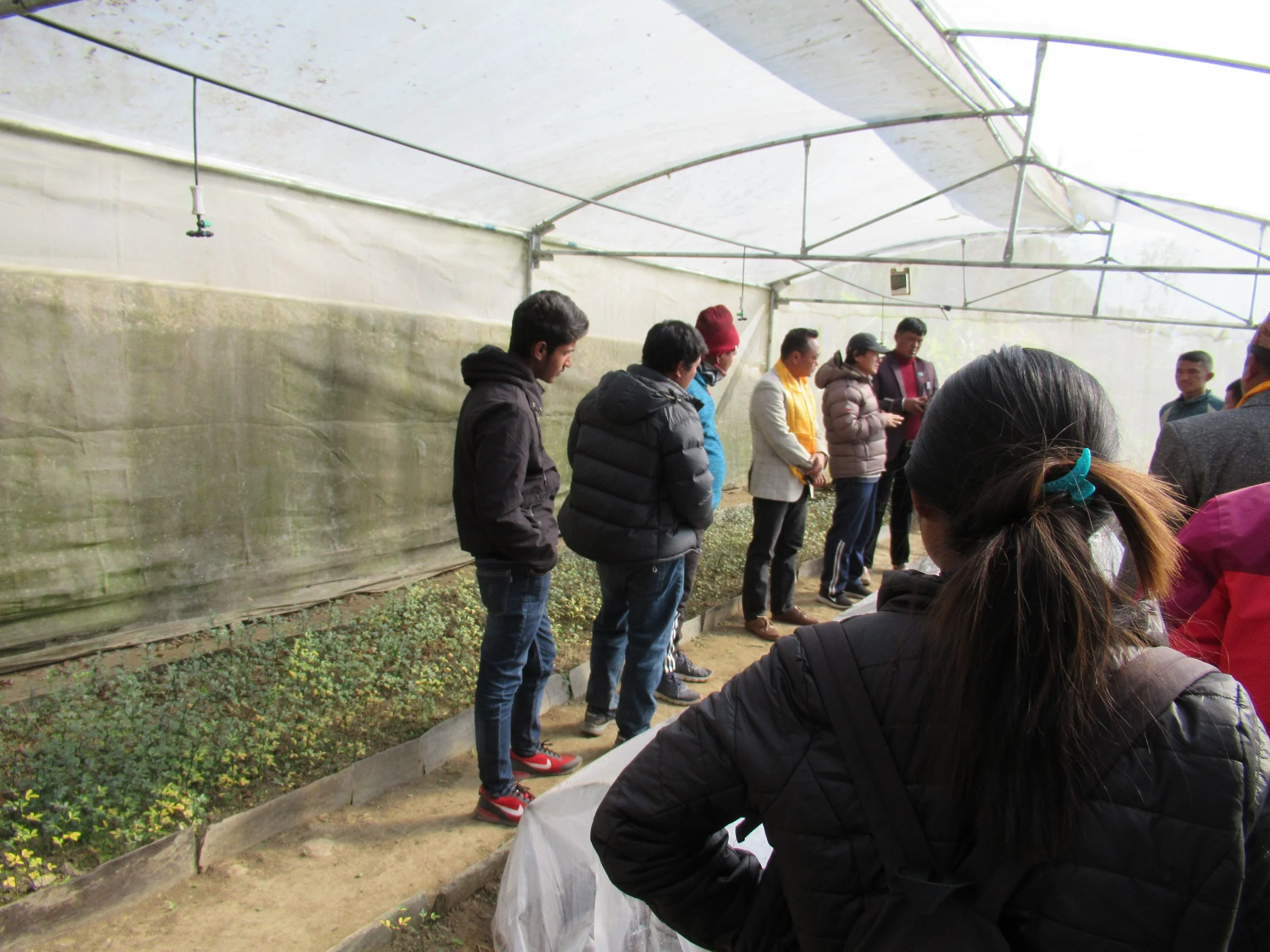The history and future of coffee in Solukhumbu, Nepal
Through the support we give to our partner NGO, EcoHimal, The Glacier Trust has been helping to enable farmers in the remote mountain community of Deusa, Solukhumbu, to grow coffee for nearly a decade. It is an effective as both a livelihood improvement and climate change adaptation strategy. With coffee growing now well established, the community now want to establish themselves as not only coffee farmers, but coffee roasters too. It would be a striking step forward and groundbreaking in Nepal.
The Glacier Trust is determined to make this happen. If we can turn this dream into a reality, you will one day be able to trek to Everest basecamp with a hot flask of delicious coffee made with beans that have never left the community you are travelling through.
In this article, we outline the journey Nepal has been on with coffee to give you the background and context that shapes what EcoHimal and the people of Deusa, with a little bit of help from The Glacier Trust, are setting out to achieve. We start in Deusa at the Agro Forestry Resource Centre that is at the heart of the coffee revolution in Solukhumbu.
Why Agroforestry, Multi-layer Farming and the AgroForestry Resource Centre?
The majority of Nepali farmers have, up until recently, mainly been growing traditional crops such as rice, millet, maze and wheat. Growing these crops is labour intensive, which means farmers have to work hard to survive and earn even a modest living. These traditional crops are also grown in a monocultural way, making farmers are more vulnerable to bad harvests. Bad harvests can be caused by extreme weather conditions, pest and disease outbreaks (both problems exacerbated by climate change) and, with the continued out-migration of thousands of young people, labour shortages. As climate change impacts deepen in Nepal, the future of countryside and farming communities looks very challenging.
Deusa Agro Forestry Resource Centre, Solukhumbu, Nepal
This, however, is changing in at least a few areas due to the use of agroforestry and multi-layer farming, the intentional integration of trees and shrubs into crop and animal farming systems in order to create environmental, social and economic benefits.
In the last decade, with the help of EcoHimal and The Glacier Trust, and the establishment of the first AgroForestry Resource Centre (AFRC) in Deusa, Solukhumbu Distirct, thousands of Nepali farmers have planted fruit and nut trees in wasteland and underutilized areas, and on their sloping terraces. These shade and orchard trees, shrubs and ground level vegetables are planted carefully and in such a way that four different crop layers develop. In Deusa, the coffee trees are flourishing, more farmers are getting involved, the number of trees as well as the yields are increasing considerably, and coffee has become an important major earner for farmers.
Coffee seedlings ready for distribution at Deusa AFRC
The AFRC at Deusa, established in 2012, is now a very successful locally owned and run cooperative. Deusa AFRC’s accomplishments have been such that there are now eleven such AFRCs in six different districts across Nepal – and many local governments are demanding more.
Deusa AFRC coordinates the distribution of young coffee and numerous other fruit and nut saplings and seedlings. It doubles up as a training centre and community meeting place where knowledge and stories as well as seeds, seedlings and saplings of all sorts are shared.
A Brief History of Coffee in Nepal
Folklore has it that coffee was introduced to Nepal by a gentleman called Hari Giri. He brought it into the country in 1939 from the then Burma, and first planted it in his backyard in Gulmi District, a central area of Nepal. The coffee grew and produced well, and Hari distributed the cherries and seeds to other impressed and interested farmers. For decades, the pioneer growers produced coffee for home use with a few sales to India.
As time went by, Gurkha soldiers stationed in various parts of the world, and Nepalese labourers, who worked at coffee farms in South India, brought in more Arabica coffee, the best quality coffee species and the main type grown in Nepal. In 1968, thirty years after Hari’s first introduction, the Government began importing coffee seeds from India. They distributed them to farmers in Gulmi, Palpa and Arghakhanchi Districts.
In 1983, the Nepal Coffee Company was established, it purchased dried coffee cherries from producers, and processed it for the domestic market. Commercial coffee production only started in the 1990s, and has expanded significantly since then. To support the further development of tea and coffee production in the country, the National Tea and Coffee Development Board (NTCDB) was established in June 1993, under the Ministry of Agriculture and Livestock Development.
The Current National Picture of Nepali Coffee
Arabica coffee is now grown in at least 40 districts across Nepal. Nepalese coffee is considered by overseas importers as of good, sometimes excellent quality, and worldwide, regional and national demand remains high. The Specialty Coffee Association of America, as one example, now recognizes the coffee produced in Nepal as a high standard coffee. The demand for organic coffee was recognized in the early 2000s, and the great majority of coffee now grown in Nepal is organic.
Even just fifteen years ago, folks in Nepal relied almost completely on instant coffee, a different drink altogether. Thankfully things have changed. Back in 2005[MP1] , on a two-mile commute across Kathmandu, you’d be fortunate to pass one coffee selling outlet. Within a decade this situation had changed completely, you would have a dozen, maybe more, opportunities to buy hot Nepalese coffee – a café on every street corner and a few in between. Kathmandu is a city of trends, but the coffee trend is not ebbing, it is here to stay. Coffee is very much part of the fabric of daily life for residents and tourists in Nepal’s bustling capital.
That is Kathmandu, but it is not unique. Nepali coffee cafés are springing up everywhere, in the mountains and hills, and now in the terai. Prices for a cup range quite markedly, from Rs 150 to Rs 450, depending on how the owners of the establishments view themselves.
The national demand for coffee cannot be met by national production, and the same is true of the international demand for Nepali coffee. Some cafés genuinely sell high quality coffee from Nepal, although – whisper it quietly – there are strong rumours that one or two companies and many a café sell coffee from cheaper beans imported from India and Vietnam. Visitors should not believe everything they read on the websites and coffee packages.
Coffee house in Bhaisepati, Kathmandu
Coffee grows best at altitudes of between 800m and 1600m, Nepal has many areas in the mid-hills which are therefore very suitable for coffee. It is generally agreed that the highest quality coffee comes from areas between 1000m and 1400m, but this is changing as global average temperatures rise; coffee is gradually migrating up the hillsides.
There is still plenty of potential to expand production in Nepal. Only a very small percentage of the estimated one million hectares of land well suited to coffee is currently planted. Although identifying accurate data on coffee is difficult as much of it is conflicting (even from the same source), expansion of the area under coffee will have significant economic benefits.
In 2017, it was estimated that some 32,000 farming households were engaged in coffee production, and annual coffee production over the last few years is in the region of 400 to 500 tonnes of roasted beans. Around 20% of Nepal’s coffee is exported to Japan, South Korea, the USA, Australia, Germany, and to several other European countries, including the UK.
Some facts and figures according to the National Tea and Coffee Development Board in August 2023:
in the fiscal year 2021/22, 355 metric tonnes of green coffee beans (before roasting) were produced from 3,346 hectares in Nepal; the area planted to coffee has steadily increased over the 10 years, although the COVID lockdowns and fluctuations between day and night temperatures have affected production in the past few years;
national consumption of coffee in Nepal totals around 2,500 mt (metric tonnes), and the country can only provide about 15% of this – 85% of the green coffee beans imported into Nepal annually comes from the southern states of India;
some 70 mt of green coffee beans are exported annually, so only about 285 mt of coffee beans are available for consumption in Nepal;
the local demand for domestic coffee stands at between 4,000 to over 7,000 mt annually according to various estimates – the latter estimate is over 13 times the national production;
the annual demand internationally for green coffee beans from Nepal is estimated to be 14,000 mt.
To summarize – demand is much higher than production, demand for Nepali organic coffee is huge in the international market, local demand is let’s say, around 5,000 tonnes (including the instant stuff), and Nepal produces only around 300 to 500 tonnes depending on seasonal factors. The shortfall and scope for expansion are huge!
The Coffee Picture in Solukhumbu
EcoHimal, The Glacier Trust’s implementing partner in Nepal, is just one of many NGOs/INGOs that have tried to boost coffee production over the last few decades. In the Solukhumbu communities, older coffee trees, planted some 15 to 20 years ago by various I/NGOs and projects, can be observed.
Harvesting coffee beans from the revitalised trees in Deusa, Solukhumbu
Most of these trees were planted for experimental, testing reasons – does it grow well? - so little emphasis was placed on production and processing. Many hundreds were planted across the district but little follow-up was provided, and as the farmers did not know how to harvest and process the cherries into roasted beans, most of the trees were chopped down after a few years, which at least produced fodder for the goats, and firewood for the kitchen.
Unlike the previous I/NGOs who planted these trees, and visited the new plantings after a year ….oh yes, they have survived, good…. and left, never to be seen again, The Glacier Trust and EcoHimal do not work like this – we will remain in Solukhumbu until the AFRC at Deusa, the new coffee roaster, the local government and private sector no longer need the technical and financial support that we have provided over the last 10 years.
The revival of the coffee trees and the beginning of part two of the coffee story in the Duesa area of Solukhumbu dates back to 2014 when Narayan Dhakal, the Director of EcoHimal, observed Net Kumar Rai preparing to cut down a coffee tree on his farm in the village of Rindapu; Net Kumar said there were originally some 150 coffee trees planted on his land but he had already cut down almost 100 as nobody there knew what to do with them. Narayan persuaded him to stop felling the trees, and he went away …. and thought….. and planned.
The result was Deusa AFRC, which now produces and distributed thousands of seedlings, including coffee, for the local farmers, while training them in agroforestry, coffee cultivation and management, and multi-layer organic farming. You can read more about the origin’s of Deusa AFRC in The Glacier Trust’s book, Great Adaptations.
Coffee cultivation training at Deusa AFRC, Solukhumbu
Is our Solukhumbu coffee any good? Our current roaster, The Nepal Organic Coffee Products company, run by the Ghimere father and son team, say that our coffee is of very good quality, and the Glen Lyon Roasters Ltd. in Perthshire, Scotland stated in 2018 that: “It’s a very good coffee, rich and big bodied, with flavours of treacle and dark chocolate. Low in acidity. There’s some spiciness in it and tones of prune and tobacco. A lot of people will like this. It will go well with milk….and it will make a really good espresso too.”
We are planning for some more quality tests both in Nepal and the UK in the coming months to ensure we are still on the right track.
Harvested coffee cherries, ready for pulping, sorting, and drying
The Recent Coffee Progress in Deusa
Since 2015, a total of 753 farmers in the Deusa area have been trained in coffee production, initially be an expert and in the last few years by the staff at the AFRC. A further 143 farmers have been trained in the first half of 2023. By the end of 2024, we estimate that a further 350 farmers will have been trained, bringing the total to over 1,000 skilled coffee farmers ready to supply the new processing and packaging facility.
The expansion of coffee in the area is summarized below, with future estimates shown in italics.
Historical and projected expansion of coffee production in Deusa, Solukhumbu
In 2014, we estimate that there were less than 2,000 poorly managed coffee trees in the Deusa area from the earlier plantings on the fields of 53 farmers. By 2020, there were 47,000, and we estimate that by 2026, there will be over 100,000 trees, and the number of farmers involved in coffee production will have reached 2,500. Production of coffee will have risen from 0 in 2014 to nearly 20 mt in 2026.
Hand roasted coffee demonstration at coffee production training at Deusa AFRC
We are already making a difference, but we can deepen our impact by securing the funds needed to establish a coffee processing unit in Solukhumbu. If we don’t the parchment coffee will continue to be shipped to Kathmandu for processing by the large-scale merchants, and our farmers will miss out on the increased earnings that their hard work and efforts richly deserve.
The Economics of Coffee for the Farmer in Solukhumbu
In 2023, the farmers of Solukhumbu received NRs 550/kg (around £3, or $4) for their parchment coffee. In parchment form, the coffee bean is almost completely dry and still has the protection of the natural thin skin layer (the parchment) that remains after the fruity cherry has been removed. In this form, the coffee is transported, by jeep, to Kathmandu, where the parchment is removed, leaving the beans to be cleaned, sorted and roasted. The roasters can then typically sell the beans on for NRs 2,000/kg (£12; $ 15) – a healthy margin.
A survey in July/August 2023 investigated the price range of coffee in the shops and cafes of Kathmandu – a total of 15 establishments were visited. The price of one kilogramme of roasted coffee (beans and ground) ranged widely from NRs 2,000 to 4,833 (£11.70 to £28.24; $15 to $36), and the average was NRs 3,059 (£18, $23) – a huge mark up from the NRs 550 received by the farmer.
Our aim is to keep more of the income in Solukhumbu for the farmers by roasting and packaging the coffee in the District. Doing this will create a unique premium organic product in a sustainable, sophisticated, but simple package for direct and online sale to individual customers, retailers, hotels and coffee houses throughout the country – including Kathmandu.
In addition, Solukhumbu is home to the mighty Sagarmartha (Mount Everest), this means we have the opportunity to sell high quality locally grown coffee that has been farmed, processed, roasted, and packaged in Solukhumbu to trekkers who visit the many guesthouses and coffee houses on the trails in this world-famous region. The coffee growing communities are, needless to say, very excited about this venture. We are sure the tourists and mountaineers will be thrilled by the chance to drink coffee that has never left the Solukhumbu district.
What is the Plan? the solukhumbu roasting and packaging cooperative
Deusa AFRC and EcoHimal have a very good relationship with Mayor and staff of the local government, the Thulung Dudhkoshi Rural Municipality, who have promised to provide several rooms for the coffee processing and packaging in the municipality headquarters of Mugli. The funds raised will be used in Nepal for the establishment and early running costs of The Solukhumbu Roasting and Packaging Cooperative. The budget, available on request, covers pulping machines and drying racks, a store for the parchment coffee, sorting and grading tables, lights and machines, a husking machine, a roaster, grinding and packaging equipment, a coffee maker, and salaries for two full time staff to run the whole operation.
The Mayor of Thulung Dudhkoshi Rural Municipality (yellow scarf) inspecting the nursery at the Deusa AFRC
The cooperative in collaboration with the Deusa AFRC staff will become a quality control and training hub to ensure that farmers know how to properly prepare the coffee parchment before arrival. We will be providing a premium but realistic price to the farmers which will ensure that the cooperative receives the bulk of all the locally grown organic coffee.
We will store the coffee as parchment coffee (protected from pests and disease by the thin skin), and roasted and packaged on demand to ensure a fresh, high quality product.
This plant will be mostly operational for just four to six months a year (March to August), following the coffee harvest. There is potential to utilise the facility for the other six months by processing other local products, such as fruits, nuts, and pumpkin seeds, that can be roasted, dried and packaged with the same tools and machinery.
Establishment and development of the processing unit will be overseen by EcoHimal with The Glacier Trust’s support for up to five years to ensure quality and sustainability, and then management will be taken over by a locally run farmer cooperative, under the watchful eyes of the local government, who have committed to providing subsidies and support every year on the basis of their annual plans and budgets. Farmers who become members of the Cooperative will receive additional benefits, such as a premium price for their coffee, as well as training and advice from technical experts.
By the time EcoHimal and The Glacier Trust hand over the operational management to a farmer cooperative, we will have established a reserve fund to ensure equipment and facilities can be properly maintained and replaced when necessary. These funds will be 5 to 10% of the profits and will be saved in a separate bank account.
get involved
To establish the Solukhumbu Processing and Packaging Cooperative, we need to raise funds to purchase essential capital equipment. If you can help us meet these start up costs, please get in touch or simply make a donation. To stay in touch with our work, please sign up to our newsletter and follow us on Facebook, Twitter, and Instagram. Thank you.


